Why Is Your Cat Gaining Weight But Not Eating?
Is your cat suddenly plumper than normal, despite no changes in its food intake? The health risks associated with being overweight make this a cause for worry. So, the question is, why is your cat gaining weight but not eating?
Cats may gain weight due to factors like medical conditions (hypothyroidism, Diabetes, Kidney disease), pregnancy, or behavioral issues like emotional upset, food consumption, inactivity, and boredom. These reasons should be considered when addressing their health.
Do you, however, know why your cat becomes overweight due to these conditions? Read on so that we may learn the causes and potential remedies for this problem.
Want to know more about cats:
Can Underfeed a Cat Cause Weight Gain?
Underfeeding a cat is not directly linked to weight gain. The experts suggest that underfeeding can lead to weight loss and related health issues, as indicated by signs such as weight loss, increased vocalization, lethargic movements, and a dull coat.
Cats that are not getting enough nutrients may lose weight rather than gain it.
A List of Diseases That Cause Weight Gain in Cats
Keeping an eye on our furry pals is necessary; they can gain weight due to health issues. And as mentioned, sometimes, there are medical reasons for it, so addressing these concerns instantly is vital for their wellness.
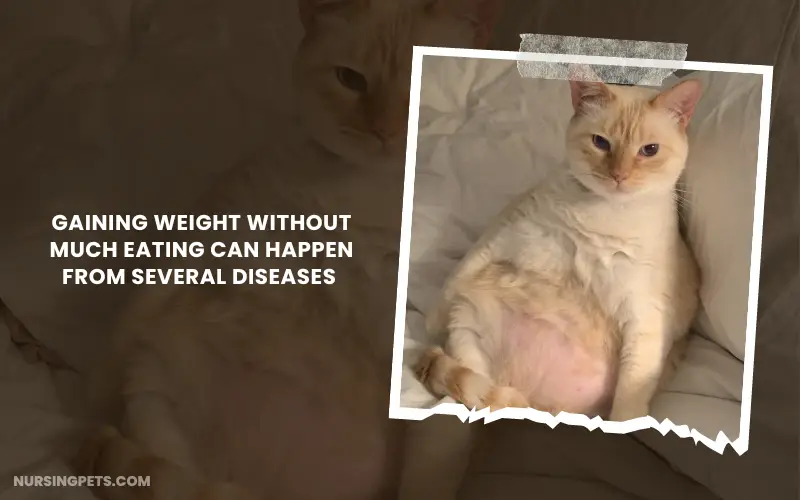
1. Hypothyroidism
Thyroid hormone deficiency causes it. This slows your cat’s metabolism, causing pounds gain even while they’re eating normally. Cats afflicted with hypothyroidism often display signs of lethargy, accompanied by dry skin and noticeable hair loss.
2. Diabetes
Certainly! Cats with Diabetes can indeed gain weight. The condition affects their metabolism and insulin response, causing excess blood sugar to convert to fat. Just like in humans, this can lead to weight accumulation. Cats with Diabetes also have increased thirst, urination, and fatigue.
3. Cushing’s Disease
Cortisol overproduction causes Cushing’s disease. Weight gain, thirst, urination, drowsiness, and a pot-bellied look might result.
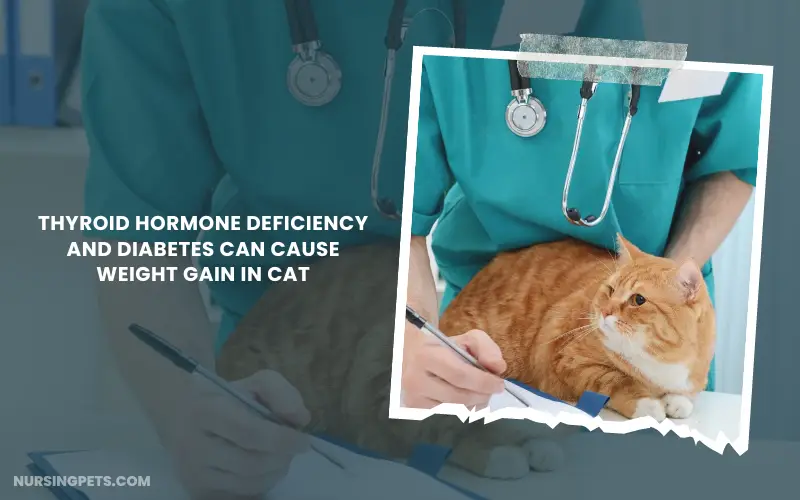
4. Acromegaly
The rare hormonal condition acromegaly can causes growth hormone overproduction. Even if cats are eating normally, this might induce weight gain and other problems. Cats with acromegaly may increase body mass, increased hunger, lethargy, facial abnormalities, and larger paws.
5. Polycystic Ovary Syndrome (PCOS)
PCOS Identity is a hormonal disorder that primarily affects female cats. It can disrupt the normal heat cycles and cause hormonal imbalances, potentially leading to weight gain.
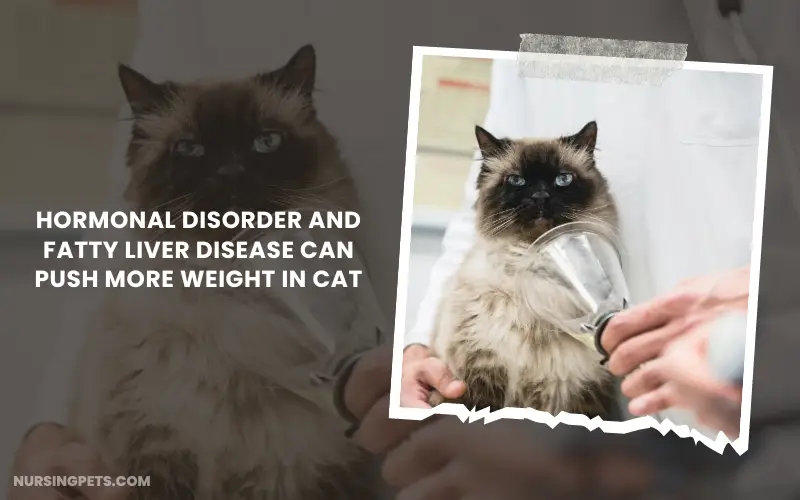
6. Heartworm Disease
While cats are not the primary hosts for heartworms, they can still get infected. Heartworm disease in cats can cause respiratory and cardiovascular issues, leading to reduced activity levels and potential weight gain.
7. Feline Hepatic Lipidosis (Fatty Liver Disease)
This condition occurs when a cat’s liver accumulates an excessive amount of fat, often due to rapid weight loss. It is more common in overweight cats that undergo sudden weight reduction, either from an underlying illness or stress.
8. Hyperlipidemia
In cats, hyperlipidemia means high levels of fats (cholesterol and triglycerides) in the blood, often linked to obesity or other health problems. It can lead to weight gain or make losing weight challenging.
9. Medication-Induced Weight Gain
Just like humans, cats can experience weight gain due to certain medications. Some prescriptions might affect their metabolism or boost their appetite, leading to gradual weight gain over time.
Behavioral Reasons for A Cat’s Weight Gain
As we mentioned, cats gaining weight without much change in diet can occur for several reasons. And one of them could be behavioral changes or issues. Here are some possible behavioral explanations for your cat’s heft growth even though it isn’t eating any more than usual:

Stress
You may wonder how stress can let a cat gain weight. Normally under stress, animals lose their appetite, so they should lose weight.
So, can stress cause a cat to gain weight? Cats can sense changes in their surroundings which can cause stress, and they may become less active because of that. Therefore, they can gain weight as a result of their idleness.
It’s conceivable that your cat is under stress and gaining kilos if you’ve recently relocated, adopted a new pet, or changed anything else about their routine.
Lack of Physical Activity
Inactivity may lead cats to acquire weight since they don’t expend enough calories to keep their body mass within a healthy range. This may be especially true for indoor cats since they do not go outside areas for play and exploration.
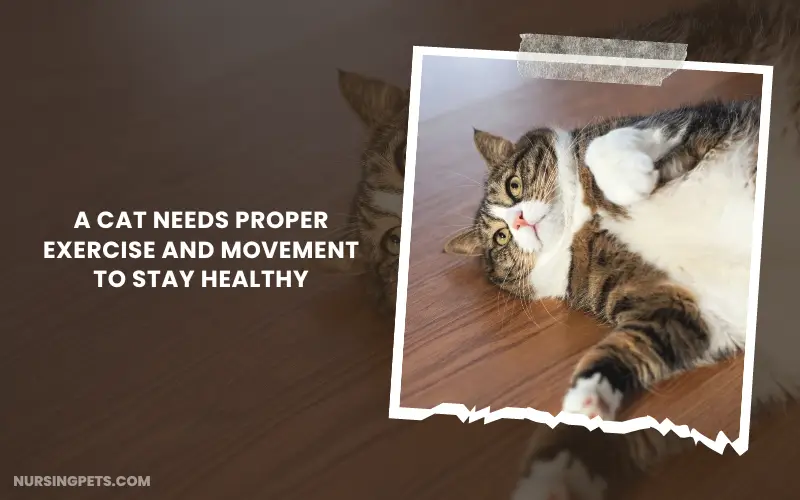
Cats are naturally hunters; therefore, they need chances for physical exercise to keep healthy. Weight gain may result from cats becoming sedentary and less active due to their inability to engage in regular physical activity.
Pregnancy
A pregnant cat may put on weight. In truth, cats’ weight rise during pregnancy is typical and healthy. When a cat is pregnant, her physique changes significantly to assist the growth and development of her unborn kittens.
These modifications may take the form of an increase in hunger and steady weight gain throughout the pregnancy.
Boredom
When our feline friends get bored, they may turn to excessive eating or move less and become prone to gaining weight. Just like us, they need mental stimulation and engaging playtime to stay healthy and happy.

Over-Supplementation or High-Calorie Food
Being overweight can be caused by providing cats with excessive supplements or high-calorie foods, even if their regular diet is not large. Some meals are just so calorie-packed, even in small amounts, it adds up! Gotta watches those portions!
Signs That Indicate Weight Gain in Cats
Recognizing signs of weight gain in cats is crucial to address the issue promptly. Here are some common signs that may indicate your cat is gaining weight:
Visible Changes In Body Shape
Observe your cat’s body from above. A noticeable weight gain may result in a loss of a defined waistline and a rounder, less tapered appearance.
Difficulty Feeling Ribs
When you lightly run your hands along your cat’s ribcage, you should be able to feel the ribs without pressing too hard. If you have to apply significant pressure to feel them, it might indicate excess fat covering the ribs.
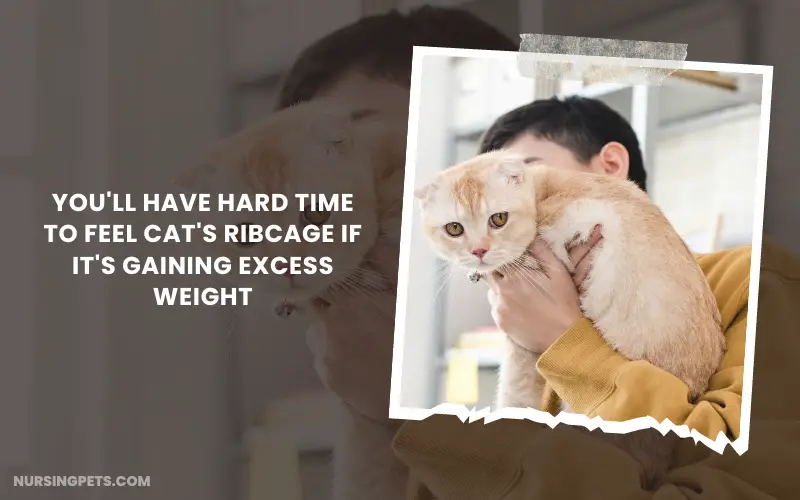
Excessive Abdominal Fat
Gently press on your cat’s abdomen. If it feels firm and rounded, it could indicate an increase in abdominal fat.
Difficulty Grooming
Cats that are overweight might have trouble grooming themselves effectively, leading to an unkempt or scruffy appearance.
Changes in Mobility
Weight gain can lead to reduced mobility and agility in cats. You may notice your cat becoming less active, having difficulty jumping or tiring more quickly during play.
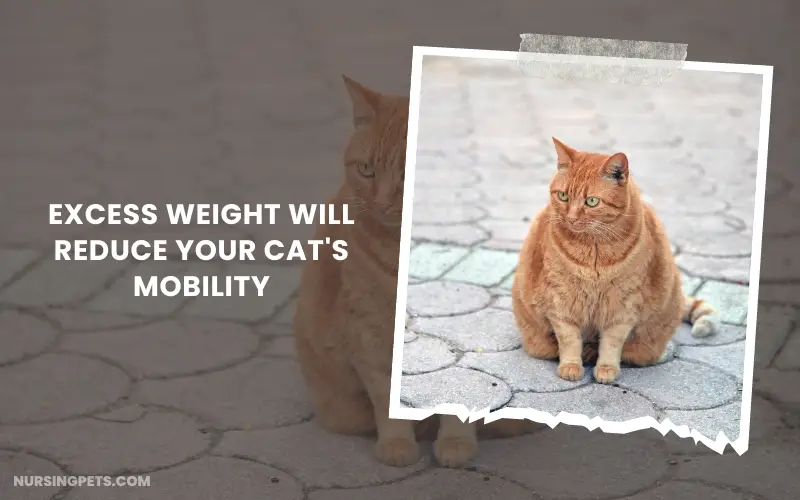
Shortness of Breath or Panting
Overweight cats may exhibit signs of labored breathing or panting, especially after minimal physical activity.
Lack of Interest In Play or Exercise
Weight gain could be a contributing factor if your cat used to be playful and active but has become lethargic and disinterested in physical work or movement.
Changes In Appetite
While weight gain itself may not directly cause a change in appetite, you should monitor your cat’s eating habits. Some cats may overeat and show an increased interest in food.
Increased Napping
Excessive sleeping can be associated with fat obtained in cats. When this happens, it can lead to reduced energy levels and decreased overall activity. As a result, they may spend more time resting and sleeping.
Tips for Managing Weight Gain of Cat
If your cat is gaining weight while eating less than normal, it’s crucial to address the underlying issue and build a physique management strategy with your veterinarian. The followings are some suggestions for controlling cat fatness.

1. Watch Your Cat’s Dietary Consumption
Keep note of how much food your cat consumes every day and modify the portion sizes appropriately. Smaller, more frequent meals throughout the day or moving to lower-calorie foods may be involved.
Choose high-quality, commercial cat food. You can try this cat seafood from Amazon, which are complete and balanced.
2. Encourage Exercise
By offering toys, climbing frames, and playing, you may get your cat moving more. This may help burn off extra calories and maintain the health and happiness of your cat.

Here are some toys from Amazon that you can try for your cat, which will keep your cat more active.
3. Consider Weight Loss Diets
Your vet might recommend a weight-loss diet if your cat’s overweight, specially crafted for safe, healthy weight reduction. They’ll assess age, weight, and activity level to determine daily calorie intake.
To stop overeating, measure food portions for each meal. Your cat’s well-being is the priority!
4. Deal with Underlying Medical Issues
Collaborate with your vet to develop a customized treatment approach for your cat’s weight gain. Identifying and addressing underlying medical concerns like diabetes or thyroid issues is vital to tackle the problem and prevent further fatness. Your feline friend deserves the best care!
5. Avoid Free Feeding
Refrain from putting food out for your cat too much all day. Overeating and fat generation may result from this. As an alternative, give your cat meals on time and scoop up any leftovers.
6. Provide Plenty of Fresh Water
Make sure your adorable cat always has plenty of fresh water available throughout the day. This helps them stay hydrated and regulates body temperature, and prevents overheating.
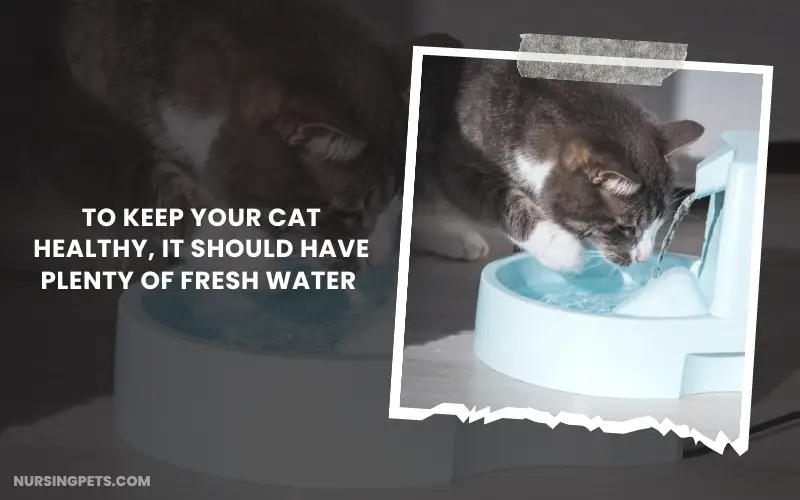
Plus, it’s a great way to support their weight management goals! Keep them healthy.
7. Monitor Your Cat’s Weight
Observe your cat’s weight closely, noting any shifts. Adjust their diet and exercise accordingly. With balanced nutrition, activity, and vet support, your feline can avoid weight problems.
Frequently Asked Questions
1. Can Drugs Result in an Increase in Weight for Cats?
Some medicines can cause pounds gain in cats. Drugs like corticosteroids can affect their metabolism, leading to increased body weight despite unchanged eating habits.
2. Can Age Cause Weight Gain in Cats?
Yes, it can. As cats age, their natural ability of metabolism will slow down. And with decreased activity levels, weight gain can occur. Senior cats may also face health issues that impact their appetite and nutrient metabolism, contributing to increased body weight.
3. Can Worms Cause Weight Gain in Cats?
Typically, cats don’t gain weight from worms. Most worms cause some kilos loss, along with symptoms like vomiting, diarrhea, and a dull coat. Roundworms, hookworms, tapeworms, and other parasites consume nutrients, leading to undernutrition and discomfort.
Conclusion
To sum up, if your cat is gaining pounds without eating, it could be due to medical issues or aging. Visit the vet for diagnosis and treatment. Adjust their diet and increase exercise to manage weight. Promptly address any sudden weight changes in cats.
Other than that, stress and other environmental factors can also push weight gain in your cats. But these aren’t very usual. However, whatever the reason, you shouldn’t let it happen. As soon as you notice anything unusual, contact a vet to determine the cause and take the necessary steps.
References:
- https://www.memphisveterinaryspecialists.com/site/blog-cordova/2021/11/15/overweight-cat
- https://wagwalking.com/cat/symptom/why-is-my-cat-gaining-weight
- https://www.matthews.carolinavet.com/site/pet-health-blog/2020/10/30/cats-cushings-disease
- https://www.webmd.com/women/polycystic-ovary-syndrome-pcos-and-weight-gain

